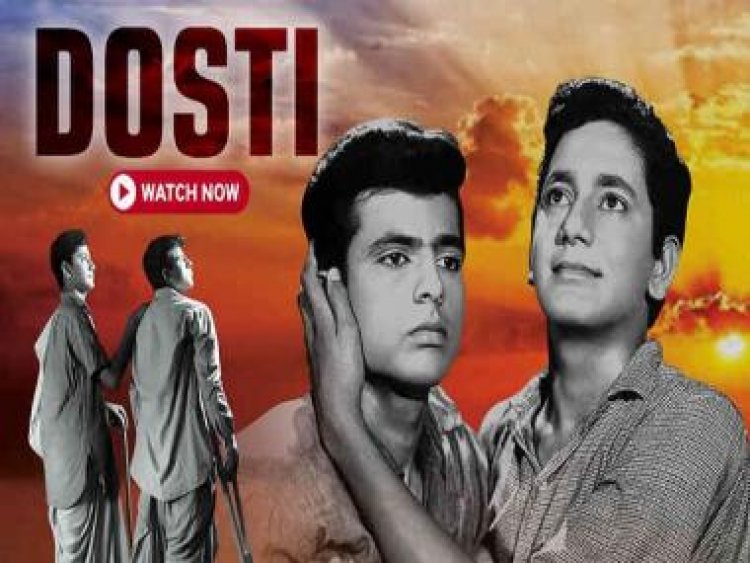Retake: Male bonding and the art of collective resistance in cinema
Retake: Male bonding and the art of collective resistance in cinema

Mid-way through Satyen Bose’s iconic film Dosti (1964) Mohan after he is asked by Ramu whether the two will separate, says “Bhagwan ne humein bichadne ke liye thori naa milaya hai”. It’s an eerie scene acted with gluey innocence to which sympathy – rather than empathy – is expected to stick. Rather absurdly the same cinema that has obsessed over the trope of people getting lost in the swarming crowds of a perilously hot country, there has been this counter narrative of discovering your ‘other’ family. In Dosti, Ramnath, a young boy who has recently lost his father, mother and a leg, finds another urchin from the streets in Mohan. The former cannot run, while the latter cannot see. Together they form this inextricable, but co-dependent bond that is their own way of instinctively fighting disenfranchisement.
In Priyadarshan’s Hera Pheri, Ram and Shyam are two bottom pile survivors who are down on their luck and desperate for a chance. They don’t exactly set out as friends, but gradually settle into a relationship of economic convenience. While one acts as the heady decision maker, the other helms the moral centre of the story. In perhaps the most iconic film of Hindi cinema, Jay played by Amitabh Bachchan and Veeru played by Dharmendra, represent an alliance of rebellion. Unlike Dosti the two never exchange affectionate glances, but here the handicap is a lack of franchise – family, a surname to hang onto, or cultural heritage of any kind. In Hera Pheri both men meet as outcomes of a system that is keen to spit out the underprivileged. Across these friendships there are moments of crippling anger against the hand that life has dealt and yet there is a return to the safety of the higher ground.
Looked through the lens of homoeroticism that modernity regularly summons, Dosti takes on a whole different meaning. Remove that lens and it remains an innocent little portrayal trying to etch in the mind a safekeeping portrayal of friendship. Both Ramu and Mohan, are more than anything else morally assured men who want to do the right thing. Ramu yearns for a family more than he yearns for the ability to see and Mohan wants to study, to make something out of himself. These are all noble intentions, written in a condescendingly pristine manner that discounts the hardships of the street where the two literally sleep. It’s a classist way of writing poverty expecting it to be the submissive victims of both oppression and erasure. Jay and Veeru on the other hand construct their own moral boundaries, lines that they themselves would not cross. The same could be said, perhaps of the thoroughly entertaining Bade Miyan Chote Miyan.
In Hera Pheri, two men pushed into a corner by systemic disenfranchisement subsequently choose the shove. It’s not glorious, but conveniently written to be forgivable. But unlike the previous stories, this is also a friendship that is self-reflective, open to contradictions. Male bonds have now evolved to a point where class is near redundant, the question of privilege absent. Dil Chahta Hai, Dostana, Zindagi Naa Milegi Dobara etc are all fantasies where the only friction that exists is the illusion of choice. Hindi cinema understood early on that most male friendships would be summoned as a way to resist the entourage of life’s many struggles and sufferings and yet a decade after globalization, the male friendship has turned into a classy experience, a vehicle that must also be ridden with declarative joy of abandon and carelessness. Class, money, poverty disappear in these modern portrayals of kinship by other means and it shows in the way we choreograph relationships today – social media etc. More about how the mechanics of spending time together compared to assisting each other’s emotional, maybe even physical, sustenance.
Male friendships have over the last two decades also become toxic franchises, a subtle indictment of the cultures men form around the opposite sex – Pyaar ka Punchnama. The male bond has therefore undergone a 180 degrees of change, from being resolute repartees against systemic oppression to becoming an instrument of oppression itself.
Dosti is the kind of film that evolves with age. Viewed as an adult it feels a simplistic analogy for brotherhood. Analysed a little deeply and it seems blind to the violence of the streets, the chaos of an India comprehending where the borders of that street begin and end. But read subversively, the same film is a tribute to the many borrowed relationships one must nurture in a hard country like ours. It takes not just family, but many brotherly bonds to survive a country that might make you feel handicapped as a matter of routine. Sometimes all you need to break this routine is a familiar shoulder, a stronger hand, and the confidence of someone endorsing your worst instincts. It isn’t a recipe for a glory but it helps survive everything that comes in the way.
The author writes on art and culture, cinema, books, and everything in between. Views expressed are personal.
Read all the Latest News, Trending News, Cricket News, Bollywood News,
India News and Entertainment News here. Follow us on Facebook, Twitter and Instagram
What's Your Reaction?

























































